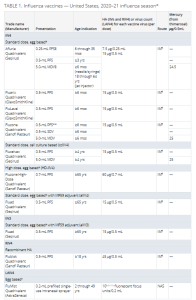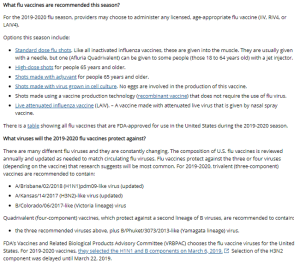All the below links and excerpts are in English.
取り急ぎ標記関連リンクと当方作成の抜粋を以下のとおり貼っておきます。
Key Facts About Seasonal Flu Vaccine | @CDCgov


Flu Vaccination
How do flu vaccines work?
Flu vaccines cause antibodies to develop in the body about two weeks after vaccination. These antibodies provide protection against infection with the viruses that are used to make the vaccine.
The seasonal flu vaccine protects against the influenza viruses that research indicates will be most common during the upcoming season. Most flu vaccines in the United States protect against four different flu viruses (“quadrivalent”); an influenza A (H1N1) virus, an influenza A (H3N2) virus, and two influenza B viruses. There are also some flu vaccines that protect against three different flu viruses (“trivalent”); an influenza A (H1N1) virus, an influenza A (H3N2) virus, and one influenza B virus. Two of the trivalent vaccines are designed specifically for people 65 and older to create a stronger immune response.
What kinds of flu vaccines are available?
CDC recommends use of any licensed, age-appropriate influenza vaccine during the 2020-2021 influenza season, including inactivated influenza vaccine [IIV], recombinant influenza vaccine [RIV], or live attenuated influenza vaccine (LAIV). No preference is expressed for any influenza vaccine over another. Both trivalent (three-ingredient) and quadrivalent (four-ingredient) influenza vaccines will be available.
Quadrivalent flu vaccines include:
Standard-dose quadrivalent influenza shots that are manufactured using virus grown in eggs. These include Afluria Quadrivalent, Fluarix Quadrivalent, FluLaval Quadrivalent, and Fluzone Quadrivalent. Different influenza shots are licensed for different age groups. These four vaccines are approved for people 6 months of age and older. Most influenza shots are given in an arm muscle with a needle. One quadrivalent influenza shot (Afluria Quadrivalent) can be given either with a needle (for people aged 6 months and older) or with a jet injector (for people aged 18 through 64 years only). …
Are any of the available flu vaccines recommended over others?
…the Advisory Committee on Immunization Practices (ACIP) recommends…including inactivated influenza vaccine (IIV), recombinant influenza vaccine (RIV), or live attenuated nasal spray influenza vaccine (LAIV4)…
Who Should Not Be Vaccinated?
… Factors that can determine a person’s suitability for vaccination, or vaccination with a particular vaccine, include a person’s age, health (current and past) and any allergies to flu vaccine or its components. …
Flu and COVID-19
Does a flu vaccine increase your risk of getting COVID-19?
Vaccine Effectiveness
Can I get seasonal flu even though I got a flu vaccine this year?
What protection does a flu vaccine provide if I do get sick with flu?
Vaccine Benefits
What are the benefits of flu vaccination?
Vaccine Match
What if circulating viruses and the vaccine viruses are different?
Why is there sometimes not a good match between a vaccine virus and circulating viruses?
Flu viruses are constantly changing (called “antigenic drift”) ? they can change from one season to the next or they can even change within the course of one flu season. Experts must pick which viruses to include in the vaccine many months in advance in order for vaccine to be produced and delivered on time. …
… While all influenza viruses undergo changes when they are grown in eggs, changes in influenza A(H3N2) viruses are more likely to result in antigenic changes compared with changes in other influenza viruses. These so-called “egg-adapted changes” are present in most of the vaccine viruses recommended for use in egg-based vaccine production and may reduce their potential effectiveness against circulating influenza viruses. …
Vaccine Side Effects (What to Expect)
Can a flu vaccine give me flu?
No, a flu vaccine cannot cause flu illness. …
What side effects can occur after getting a flu vaccine?
Flu Vaccine (Flu Shot) | @MedicineNet
Facts you should know about the influenza vaccine (flu shot)
・Types of influenza (flu) vaccines include the injection (killed virus), recombinant (made without flu virus), and nasal spray vaccines (containing live virus). …
What is influenza (flu)?
… Flu is a respiratory infection, that is, an infection that develops primarily in the lungs. People often call respiratory infections caused by other viruses the flu, but this is incorrect. These other infections are usually categorized as URIs (upper respiratory infections) and have multiple causes. …
Influenza viruses are divided scientifically into three types, designated A, B, and C. Influenza types A and B are responsible for epidemics of respiratory illness that occur almost every winter. Influenza type C usually causes either a very mild respiratory illness or no symptoms at all; it does not cause epidemics and does not have the severe public health impact of influenza types A and B. Type A viruses are divided into subtypes and are named based on differences in two viral surface proteins called hemagglutinin (H) and neuraminidase (N). There are 16 known H subtypes and nine known N subtypes. …
The so-called swine flu pandemic of 2009 was caused by a novel influenza A virus designated H1N1 based upon its surface protein types. This virus was originally referred to as swine flu because many of the genes in this new virus were very similar to influenza viruses that normally occur in pigs in North America. However, this virus was actually quite different from the typical swine flu viruses found in pigs.
Types of seasonal influenza vaccine | @WHO_Europe
Two types of influenza vaccine are widely available: inactivated influenza vaccines (IIV) and live attenuated influenza vaccines (LAIV). Traditionally, influenza vaccines (both IIV and LAIV) have been produced to protect against 3 different seasonal influenza viruses (also called trivalent vaccines). In most countries this is still the case and the current trivalent vaccines contain influenza A(H3N2), pandemic A(H1N1) and 1 of 2 influenza B lineage viruses. However, recently vaccines which protect against 4 different viruses, including both influenza B lineage viruses (quadrivalent vaccines), have become available in some countries. …
Annual selection of viruses
The composition of influenza vaccines (both IIV and LAIV) are updated annually by WHO based on information gathered from the Global Influenza Surveillance and Response System (GISRS)…
Flu vaccine | @NHSuk
Flu vaccine and coronavirus (COVID-19)
Flu vaccination is important because:
・if you’re at higher risk from coronavirus, you’re also more at risk of problems from flu
・if you get flu and coronavirus at the same time, research shows you’re more likely to be seriously ill
・it’ll help to reduce pressure on the NHS and social care staff who may be dealing with coronavirus
If you’ve had COVID-19, it’s safe to have the flu vaccine. It’ll be effective at helping to prevent flu.
Influenza Vaccine for the 2020-2021 Season | @US_FDA
Influenza Vaccine (Flu Shot and Nasal Spray) for Adults | @WebMD
Q&A on Influenza (English; 11/21/2019) | 厚生労働省
